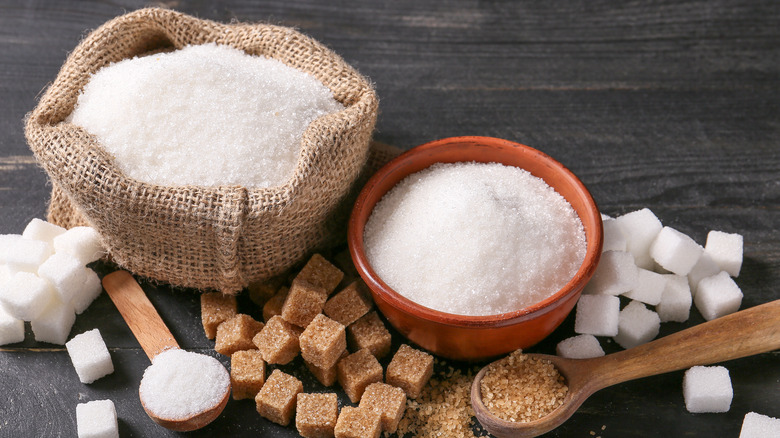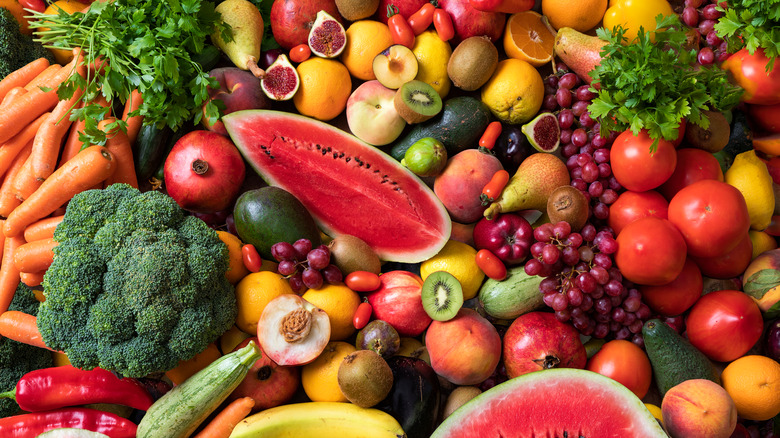Is Vitamin Water Actually Good For You?
Vitamin water has come onto the scene advertised as a healthier alternative to soda. Back in 2011, Coca-Cola even promoted this beverage as a natural immunity booster, saying that "Flu shots are so last year." As you can imagine, those claims were criticized by the medical community, reports the National Consumers League.
Most varieties of vitamin-infused water do contain essential nutrients, such as vitamin C, folate, and zinc. Coca-Cola's Multi-V Vitaminwater, for instance, has 60 milligrams of vitamin C and 3.7 milligrams of zinc per bottle. It also contains small doses of vitamin E, vitamin B6, and magnesium (per Coca-Cola Company). OSHEE Vitamin Water, a popular choice in Europe, provides magnesium, vitamin C, vitamin K, and other micronutrients (via OSHEE). Unfortunately, these beverages also tend to be packed with less desirable ingredients, such as sugar.
Note that sugar-free vitamin water isn't necessarily better. Artificially sweetened beverages may contribute to diabetes, suggests a 2015 review published in The BMJ. A good example is Coca-Cola's Zero-Sugar Vitaminwater, which contains xylitol (via Coca-Cola Company). This sugar alcohol is generally safe, but it may cause nausea, diarrhea, and digestive discomfort when consumed in high doses (per European Journal of Clinical Nutrition).
The sugar in vitamin water may increase diabetes and heart disease risk
Glaceau Vitaminwater provides 30 to 33 grams of sugar per serving, according to the Coca-Cola Company. Over time, this sneaky ingredient may contribute to obesity. A study published in the International Journal of Obesity in 2013 indicates a strong link between sugar consumption and weight gain. Some varieties of vitamin water contain cane sugar, coconut sugar, high-fructose corn syrup, or caramel. But sugar is sugar, no matter where it comes from. This additive has more than 60 different names, according to the University of California San Francisco.
Sugar is also associated with an increased risk of cardiometabolic disorders. For example, a 2019 study featured in JAMA Network Open reports that each additional 12-ounce serving of sugary beverages can increase the risk of death from all causes by 11%. Moreover, these products have been linked to higher rates of insulin resistance, a contributing factor to atherosclerosis and cardiovascular disease.
Vitamin water can indeed boost your energy, but its effects are short-lived. Sugary foods and beverages cause blood glucose spikes followed by crashes, explains Stanford Health. When your blood glucose drops below normal levels, you may experience fatigue, irreparability, poor mental focus, anxiety, and hunger pangs. Unfortunately, eating more sugar to regain your energy is a bad choice. Instead, reach for high-protein foods, suggests Kelsey Herrick, a senior dietician at Stanford Health. Hard-boiled eggs, fish, cottage cheese, almonds, and pumpkin seeds are all healthy options.
Vitamin water isn't the best source of nutrients
With a few exceptions, most nutrients in vitamin water can be easily obtained from food. Vitamin C, for example, occurs naturally in citrus fruits, bell peppers, cruciferous veggies, spinach, green peas, and potatoes. A half-cup of red bell peppers delivers over 100% of the daily value for this nutrient, reports the National Institutes of Health. Vitamin B6 and other water-soluble vitamins are widely available, too. An exception is vitamin B12, which occurs mostly in animal-based foods.
And when it comes to vitamins, it's possible to have too much of a good thing. "Some people may be getting too much of some vitamins and minerals if they add vitamin water on top of fortified foods and other supplements," says American physician and nutrition researcher Walter C. Willett (via Harvard T.H. Chan School of Public Health). When it comes to water-soluble vitamins, the excess is eliminated in the urine. Fat-soluble vitamins in vitamin water, on the other hand, may not actually be absorbed into your system. These nutrients must be consumed along with dietary fat to enter the bloodstream, explains ScienceLine.
All in all, vitamin water isn't the healthiest choice. Sugar-free varieties are better than soda, but you don't really need them in your diet. Plus, they cannot replace real food. "Getting your vitamins from bottled water also seems an unnecessary expense since the price is much higher than the cost of vitamin supplements," says Andrew Weil, a leader in the field of integrative medicine (via Dr. Weil). He recommends eating a balanced diet and taking a quality multivitamin or multimineral supplement to fill nutritional gaps.



